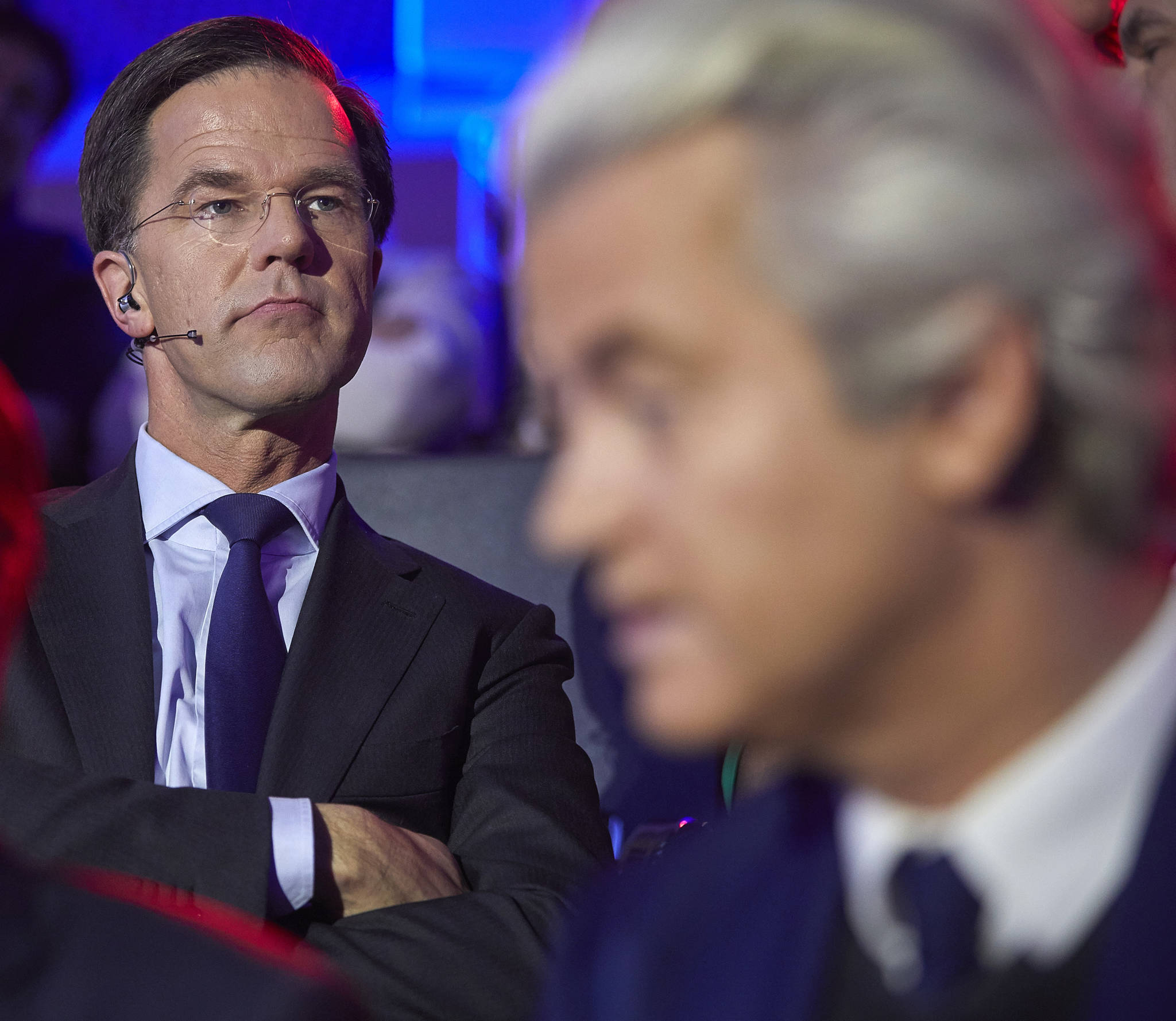THE HAGUE, Netherlands — Dutch Prime Minister Mark Rutte on Wednesday claimed a dominating parliamentary election victory over anti-Islam lawmaker Geert Wilders, who failed the year’s first litmus test for populism in Europe.
The Netherlands’ main exit poll suggested Rutte’s party won 31 seats in the 150-member legislature, 12 more than Wilders’ party, which shared second place with two other parties.
Following Britain’s vote to leave the European Union and Donald Trump’s election as U.S. president, “the Netherlands said, ‘Whoa! Stop!’ to the wrong kind of populism,” said Rutte, who is now poised for a third term as prime minister.
“We want to stick to the course we have — safe and stable and prosperous,” he added.
Wilders had insisted that whatever the result of the election, the kind of populist politics he and others in Europe represent aren’t going away.
“Rutte has not seen the back of me!!” Wilders said in a Twitter message.
Both France and Germany have elections this year in which far-right candidates and parties are hoping to make an impact.
“Wilders could not win the election,” German socialist leader Martin Schulz tweeted. “I am relieved, but we need to continue to fight for an open and Free Europe.”
Rutte, who for much of the campaign appeared to be racing to keep pace with Wilders, may have profited from the hard line he drew in a diplomatic standoff with Turkey over the past week.
The fight erupted over the Netherlands’ refusal to let two Turkish government ministers address rallies in Rotterdam about a referendum that could give Turkey’s President Recep Tayyip Erdogan more powers. It gave Rutte an opportunity to refuse to bow to foreign pressure, a stance with widespread backing in the nation.
Amsterdam Free University political scientist Andre Krouwel said the clash with Ankara allowed Rutte to tell the electorate, “‘We are the ones who really protect your interests; we are the ones who go down into the trenches to defend the Netherlands.’”
Under brilliant skies, the Dutch went to vote in huge numbers, with turnout estimated to have reached at 82 percent.
In a subplot of the elections, the Ipsos exit poll had the Green Left party registering a historic victory, turning it into the largest party on the left wing of Dutch politics for the first time.
The Greens leapt from four seats to 16 in parliament after a strong campaign by charismatic leader Jesse Klaver, who invites comparisons to Canadian Prime Minister Justin Trudeau, according to the exit poll.
“This is a fantastic result for us, a historic victory,” Green Left chairwoman Marjolein Meijer said.
It remains to be seen if the 30-year-old Klaver will take his party into the next ruling coalition, which looks likely to be dominated by Rutte’s VVD and other right-leaning parties.
The Labor Party of Eurogroup President Jeroen Dijsselbloem appeared to have been punished by voters in the election, plunging from 38 seats at the last election to just nine, according to the Ipsos exit poll.
Because of the result, it looked unlikely Dijsselbloem would be able to hang on to his post of leading the 19-nation Eurogroup, which manages the currency of the European Union nations that use the euro.
Rutte had framed the election as a choice between continuity and chaos, portraying himself as a safe custodian of the nation’s economic recovery and casting Wilders as a far-right radical who was unprepared to make tough decisions.
The chance of Wilders becoming prime minister in the Netherlands, where a proportional representation voting system all but guarantees coalition governments, was remote, even if his party had placed first in the election.
Wilders’ one-page election manifesto included pledges to close borders to immigrants from Muslim nations, shutter mosques and ban the Quran, as well as to take the Netherlands out of the European Union.
Rutte has driven through unpopular austerity measures over the last four years, but the Dutch economic recovery has gathered pace and unemployment has fallen fast.
Wilders, meanwhile, tapped into discontent among voters who say they are not benefiting from economic recovery.
The left-leaning Dutch Labor Party appeared to be hammered by its supporters for its role over the last four years in pushing through a tough austerity package as junior member in a two-party Cabinet with Rutte’s VVD.
The coalition Rutte’s VVD party had with Labor can no longer be replicated and the prime minister is likely to look to the right for new coalition partners.
The main exit poll showed Rutte controlling 31 seats, 10 fewer than his party won in the 2012 elections. Three parties each won 19 — the pro-EU center party D66, the Christian Democrat CDA and Wilders’ Party for Freedom.
Rutte has been resolute about not wanting to rule with Wilders, so that tightens the market in which he can acquire the necessary 75-seat threshold.
Weeks, if not months of coalition-building talks may be required before a new government is installed.

